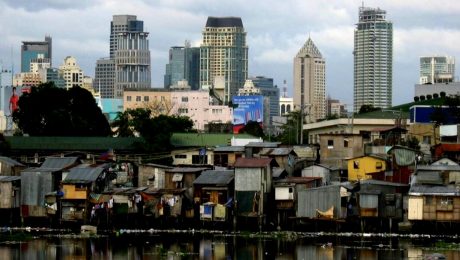
What is the biggest problem in the world today? ISIS? No. That is the effect of inequality. Drugs? No. That may be a cause of inequality, but more an effect as well. Over-population? No. The New York Times and other Think Tanks, who used to advocate mandated population control, now say poverty is the cause of over-population and NOT vice-versa; sustainable development is the solution to over-population. Climate Change? Maybe, but that is also tied to inequality if we take a closer look at it..
INEQUALITY. That is the biggest problem today.
It is the reason why Rodrigo Duterte (DU30) got elected. It is the reason why Donald Trump might just win the White House over Hillary Clinton. The campaigns of the two have shown similarity and that is why they have often been compared. No, it is not really about their political incorrectness, though that is what people normally only pick up. It is that the overarching “theme” of their personas, pronouncements and sorties is about addressing inequality. Inequality matters whether we realize it or not.
China has acted as it has acted because she perceives the US is treating her unequally. As the second largest economy, she grapples with how to deal with the largest economy, a Military Power on the other side of the planet and yet who wants to remain a Pacific Power. Both have to be careful about their geopolitics, or they could trigger WWIII. Both act as they do because it is really an effort to find solutions to the inequalities in their respective home fronts.
China is an economic power but thinks and acts like a Third World country because Beijing is still busy trying to hide its roots in the Cultural Revolution of the past. China knows that once Central Government loses its control, a social volcano would likely erupt. We can’t talk of a social volcano in the case of US; we talk of Occupy movements because they remain hopeful a “trickle down” solution might still be found as they have in the past. But with the fast developments over the last decade or so, the Top One Percent has become more and more a normal feature of the US economy and no solution to inequality is in sight.
Inequality matters. But, we can’t be explicit about it. We cannot talk of it as a theme of an election campaign, though it was the undertone of the campaign of DU30; it is of Trump. Inequality is a bitch; it is complex. We are scared of it. It is always the elephant in the room. We tackle it in an INDIRECT manner, groping and hoping. Why? …because social sciences have suddenly no answer. We also know by now that GDP and credit upgrades are very much incomplete measures of the well-being of a country.
No question, social scientists have long been concerned with inequality. This has usually been addressed from specific theoretical and/or political positions – Marxism, liberalism, feminism, anti-racism and so on. But as Mike Savage (Co-director, Institute of International Inequalities, London School of Economics) observed, these have generated foundational disputes and controversies, rather than sets of problems to work on.
Paradigms have now to be questioned. Savage: “…the reason why the work of economists such as Tony Atkinson, Joe Stiglitz and Thomas Piketty; of sociologists such as Beverley Skeggs, John Goldthorpe and David Grusky; of legal scholars such as Kimberlé Crenshaw and Nicola Lacey; of epidemiologists such as Michael Marmot, Richard Wilkinson and Kate Pickett; of political scientists such as Robert Putnam, Kathleen Thelen, Catherine Boone and Paul Pierson; of geographers such as Danny Dorling, and of social policy researchers such as John Hills, ….have become popular. The work of these social scientists typically commands more attention than their peers working on other fields, and carries sway across much of the wider social sciences. …..many of these proponents criticise their own disciplines as a means of emphasising importance of inequality studies.”
Piketty criticisms of economists do not mince any words:
“To put it bluntly, the discipline of economics has yet to get over its childish passion for mathematics and for purely theoretical and often highly ideological speculation, at the expense of historical research and collaboration with the other social sciences…”
Savage: “…the challenge of rising inequality might just be a real issue which causes genuine and effective cross-disciplinary synergy and is forcing the social sciences to reassess their disciplinary loyalty. …social sciences (have) to retool to demonstrate their contemporary relevance.”
AND YET….
Here we are debating whether the catcall and wolf whistle of DU30 was sexist or not. Okay, let us debate it for whatever lessons it might give us, but to have it as one of our headline news? Aren’t we losing focus on the biggest problem?
No comments:
Post a Comment